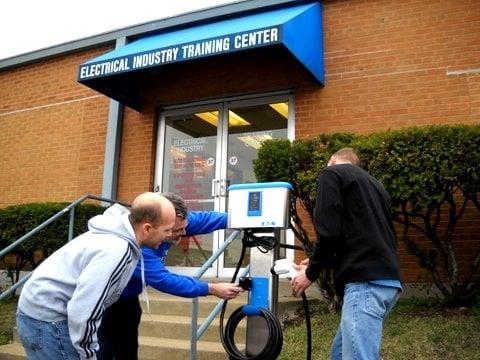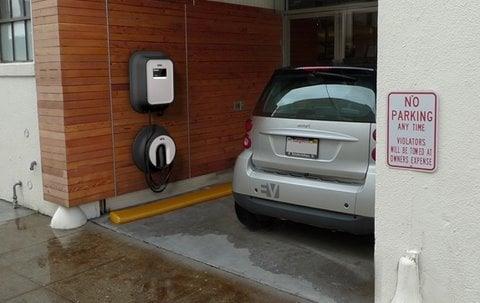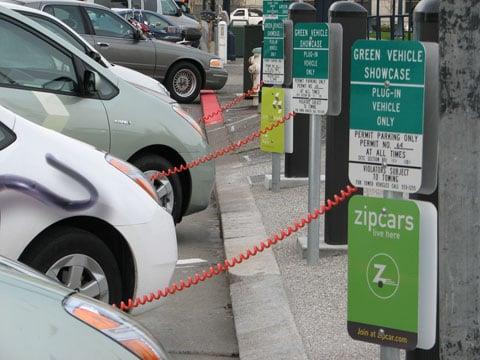 ElectricalConnection.org
ElectricalConnection.org
Connect with Us:
Facebook
LinkedIn
Twitter
YouTube
ST. LOUIS — There’s no point in having electric vehicles (EVs) if there isn’t a reliable infrastructure to charge them. To that end, the IBEW/NECA Electrical Industry Training Center in St. Louis has become the only training center locally, and the first in Missouri, to offer an Electric Vehicle Infrastructure Training Program (EVITP). The training center, located at 2300 Hampton Avenue, is operated by the Electrical Connection — a partnership of the International Brotherhood of Electrical Workers (IBEW) Local One and the St. Louis Chapter, National Electrical Contractors Association (NECA).
Leaders from the IBEW/NECA Electrical Industry Training Center helped develop a national curriculum for EVITP. It is currently the only training center in St. Louis that offers EVITP certification for installers of Electric Vehicle Supply Equipment (EVSE), such as fixed EV charging stations. For more than 70 years, the training center has supplied St. Louis and Eastern Missouri with the vast majority of its licensed electricians and communication technicians — approximately 10,000 to date.
“We were the birthplace of electrical apprenticeship training when newly mandated national apprenticeship standards were established in 1941 and have adapted to serve evolving energy and communication needs ever since,” said Dennis Gralike, director of the training center. “So it’s not surprising that we’ve taken on the task of delivering a reliable infrastructure to support powering our future mobility.”
In April 2011, Jeff Holmes, an instructor at the IBEW/NECA Electrical Industry Training Center became one of 56 instructors nationally to complete a “Master Train the Trainer” course for EVITP, which the Electrical Connection co-sponsored. Holmes and another training center instructor, Dr. Linda Little, were instrumental in developing the national EVITP curriculum. It was the culmination of a national effort to meet the growing demand for infrastructure to support the nation’s goal of producing one million EVs by 2015.
“For the EV market to be successful, there must be quality, licensed contractors and electricians installing the equipment supporting the vehicles,” said Jim Curran, executive vice president of the Electrical Connection. “It is critical for the EV consumer experience if the market is to expand.”
To date, 18 IBEW/NECA electrical contractors have completed EVITP training. Seventy-five IBEW members have also completed EVITP training and 22 more will be trained in March 2012.
“We’re very pleased with the capacity we are building among our membership to do this work,” said Douglas R. Martin, executive vice president of the St. Louis Chapter NECA (see list of contractors below).
The training includes instruction in:
It’s anticipated that 65 percent of EV infrastructure installations will be driven by vehicle owners needing fixed charging stations at their home. But since most battery EVs have a range of only 50 to 100 miles, destination points such as commercial buildings, municipalities, retail malls, big box stores, restaurant and movie theaters will need charging infrastructure as well.
“Some commercial installations can be more challenging depending on the facility and the distance to the power supply,” said Greg Booth, business manager, IBEW Local One. “For example, parking decks will require the contractor to deal with load and power supply issues. Existing parking facilities were never constructed with a power capacity to support an increasing number of EV chargers. Many new construction projects are including the necessary infrastructure to support the chargers as the market expands.”
Booth adds that retail, commercial and public locations will need to consider the flow of parking in their existing lots, signage for the EV parking spaces, ADA compliance and how the overall configuration looks and appeals to their existing customers.
“The good news is that most residences with 200-amp service will have sufficient power for a fixed ‘Level 2’ 240-volt charger hardwired into the home,” said Booth. “Level 2 chargers take four to six hours to fully charge an EV, which is far more practical than the portable chargers that come with the vehicles and take 16 to 20 hours to charge.”
To support consumer confidence and the overall customer experience, EV automakers work with program manager networks that include licensed electrical contractors who often employ electricians certified through EVITP to ensure proper and safe installations of EV chargers. The various program management companies coordinate the process for the homeowner/customer which typically includes a survey of the home’s electrical system, engaging a licensed, qualified electrical contractor to bid the work, getting the permits, and performing the installation to the satisfaction of the local inspectors. Installations must conform with Article 625 of the National Electrical Code, which covers EV charging systems.
In November 2011, the Chevy Volt, the first mass-produced, extended-range plug-in EV available in all 50 states, was introduced in St. Louis. Other EV auto brands on the market include:
Members of the Electrical Connection provide safe and reliable electrical construction, maintenance, repair and replacement services across eastern Missouri. More is online at www.electricalconnection.org.
Editor’s note: To date, the following electrical contractors are certified in EVITP:


 Photo credit: Felix Kramer
Photo credit: Felix Kramer
Recent News